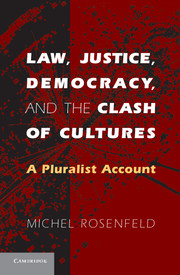Book contents
- Frontmatter
- Contents
- Introduction
- Part I Liberal Justice and Fleeting Specters of Unity
- Part II E Pluribus Unum?
- 4 Spinoza’s Dialectic and the Paradoxes of Tolerance
- 5 The Clash Between Deprivatized Religion and Relativized Secularism
- 6 Dworkin and the One Law Principle
- Part III Can Pluralism Thrive in Times of Stress?
- Bibliography
- Index
5 - The Clash Between Deprivatized Religion and Relativized Secularism
The Constitutional Conundrum
from Part II - E Pluribus Unum?
Published online by Cambridge University Press: 05 June 2012
- Frontmatter
- Contents
- Introduction
- Part I Liberal Justice and Fleeting Specters of Unity
- Part II E Pluribus Unum?
- 4 Spinoza’s Dialectic and the Paradoxes of Tolerance
- 5 The Clash Between Deprivatized Religion and Relativized Secularism
- 6 Dworkin and the One Law Principle
- Part III Can Pluralism Thrive in Times of Stress?
- Bibliography
- Index
Summary
At least in theory, liberalism and modernism can reconcile the one and the many in the religiously pluralistic polity by bestowing constitutional primacy on secularism. Consistent with this, constitutional ordering and the public sphere ought to be secular and religion protected so long as it confines its imprint to the private sphere. Post-modernism, however, as already noted, rejects the claim that secularism ought to be entitled to priority in the normative realm. Concurrently, moreover, as already briefly noted, religion has become “deprivatized” (Casanova 1994: 3), by re-emerging in the public sphere and thrusting itself “into the public arena of moral and political contestation” (Id.).
Deprivatized religion combined with relativized secularism poses new and difficult problems for the constitutional handling of the relationship between religion and the state. This is true both in terms of freedom of religion and the freedom from religion. Indeed, once religious, non-religious, and anti-religious ideologies all stake out claims to the public sphere, it seems inevitable that the advancement of one of the ideologies involved can only be at the expense of others. Freedom of religion may require institutionalizing religion, and conversely, institutional concentration on freedom from religion would most likely prejudice freedom of religion. Furthermore, to the extent that religions within a polity are mutually antagonistic, the institutional advancement of one religion’s freedom would have to be to the detriment of the freedom of other religions within the polity. Even leaving aside the already discussed case of a fundamentalist religion that insists on imposing its truth (which it irrevocably posits as the truth) on the whole polity and on its entire constitutional and institutional apparatus; and that of “strong” religion that seeks to ensure conformity of the polity’s institutions and practices with its norms, precepts, and traditions; there are bound to be vexing conflicts with no apparent satisfactory constitutional solution. For example, the teaching of evolution theory in public schools is prone to offend religious believers committed to creationism just as its prohibition would seriously antagonize secularists (Evans 1960). And even as banal a choice as designation of the official day of weekly rest in a way that conforms with the mores of the majority religion may well result to the detriment of adherents to minority religions. Thus, Sunday closing laws may significantly harm sabbatarian business owners who are committed to honoring their religion’s prohibition against working on the day that it sets aside for rest.
- Type
- Chapter
- Information
- Law, Justice, Democracy, and the Clash of CulturesA Pluralist Account, pp. 149 - 181Publisher: Cambridge University PressPrint publication year: 2011



